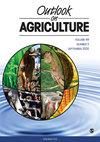赞比亚和津巴布韦玉米农业系统的可持续集约化和家庭膳食多样性
IF 2.6
3区 经济学
Q1 AGRICULTURE, MULTIDISCIPLINARY
引用次数: 1
摘要
现在距离联合国营养问题行动十年的结束日期仅剩四年时间,确定能够解决饥饿和营养不良问题的营养敏感和可持续农业干预措施的必要性已迫在眉睫。本文评估了赞比亚和津巴布韦以玉米为基础的农业系统中可持续集约化做法与饮食多样性之间的关系。利用来自1124户家庭的调查数据,我们采用工具变量方法,允许控制农民自我选择采用可持续集约化做法的事实,使采用成为内生的。我们还探索了从强化到饮食多样性的途径。我们发现可持续集约化实践(SIPs)的采用强度(如最少耕作、最少耕作和轮作、最少耕作和间作)与产量和作物多样性的改善以及平均膳食多样性之间存在显著的正相关。这些发现取决于sip的广泛采用。有必要共同努力,解决目前阻碍广泛采用的瓶颈问题,并促进更广泛的粮食品种多样化,以实现与可持续集约化有关的营养方面的共同利益。本文章由计算机程序翻译,如有差异,请以英文原文为准。
Sustainable intensification and household dietary diversity in maize-based farming systems of Zambia and Zimbabwe
With only four years before the end date for the United Nations Decade of Action on Nutrition, the need to identify nutrition-sensitive and sustainable agricultural interventions that can address hunger and malnutrition cannot be more urgent. This paper assesses associations between sustainable intensification practices and dietary diversity in maize-based farming systems of Zambia and Zimbabwe. Using survey data from 1124 households, we apply an instrumental variable approach that allows to control for the fact that farmers self-select themselves into adopting sustainable intensification practices, making adoption endogenous. We also explore pathways from intensification to dietary diversity. We find significant positive associations between the adoption intensity of sustainable intensification practices (SIPs) such as minimum tillage, minimum tillage and crop rotation, and minimum tillage and intercrops and improved production and crop diversity and in turn, dietary diversity on average. These findings hinge on there being widespread adoption of SIPs. There is need for concerted efforts to address current bottlenecks that hinder widespread adoption and promote broader food group diversification to realize the nutrition related co-benefits associated with sustainable intensification.
求助全文
通过发布文献求助,成功后即可免费获取论文全文。
去求助
来源期刊

Outlook on Agriculture
农林科学-农业综合
CiteScore
5.60
自引率
13.30%
发文量
38
审稿时长
>36 weeks
期刊介绍:
Outlook on Agriculture is a peer reviewed journal, published quarterly, which welcomes original research papers, research notes, invited reviews and commentary for an international and interdisciplinary readership. Special attention is paid to agricultural policy, international trade in the agricultural sector, strategic developments in food production, the links between agricultural systems and food security, the role of agriculture in social and economic development, agriculture in developing countries and environmental issues, including natural resources for agriculture and climate impacts.
 求助内容:
求助内容: 应助结果提醒方式:
应助结果提醒方式:


